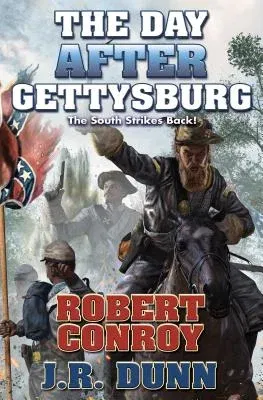New Alternate History from a Master of the Form: Robert Conroy was
an unalloyed master of alternate history. Now, J.R. Dunn completes one
of his final novels.
LEE STRIKES BACK!
After a terrible setback at Gettysburg, General Robert E. Lee does not
retreat across the Potomac and his ultimate surrender at Appomattox.
Instead, he turns the tables on Union General George Meade with a
vicious counterattack that sets the Union Army on its heels.
While Lee sets across Pennsylvania in a dazzling war of maneuver, a
crazed actor closes in on President Abraham Lincoln. Standing in his way
is Major Steve Thorne, a thoughtful lawyer-turned-soldier fighting for
the Union and his own self-respect, and Cassandra Baird, a young woman
whose courage is only surpassed by her determination to teach
emancipated slaves to read and write, and so ensure their freedom.
Opposing them is Colonel Corey Wade, a brave Confederate officer who is
just as determined to fight to the death for his honor and that of his
state. And, in the end, the fate of a nation may come down to a freed
slave named Hadrian, a man with an iron resolve never to return to
bondage.
The time has come to strike a blow for liberty--or go down swinging!
About The Day After Gettysburg:
"...expertly completed...Dunn's work matches Conroy's high standards for
writing style, solid plotting and frenetic battle scenes."--Publishers
Weekly
About Germanica:
"Conroy captures the intricacies of WWII with an eye for historical
nuance, and he crafts a believable alternate ending to the war. . . .
[T]he story is buoyed by Conroy's effective snapshot of the
era."--Publishers Weekly
"[A] gripping alternate World War II saga . . ."--Library Journal
About Rising Sun:
"Conroy extrapolates a new and militarily plausible direction for WWII .
. . A thrilling adventure."--Booklist
About Himmler's War:
"[Conroy] adds a personal touch to alternate history by describing
events through the eyes of fictional characters serving on the front
lines. VERDICT: Historical accuracy in the midst of creative speculation
makes this piece of alternate history believable."--Library Journal

